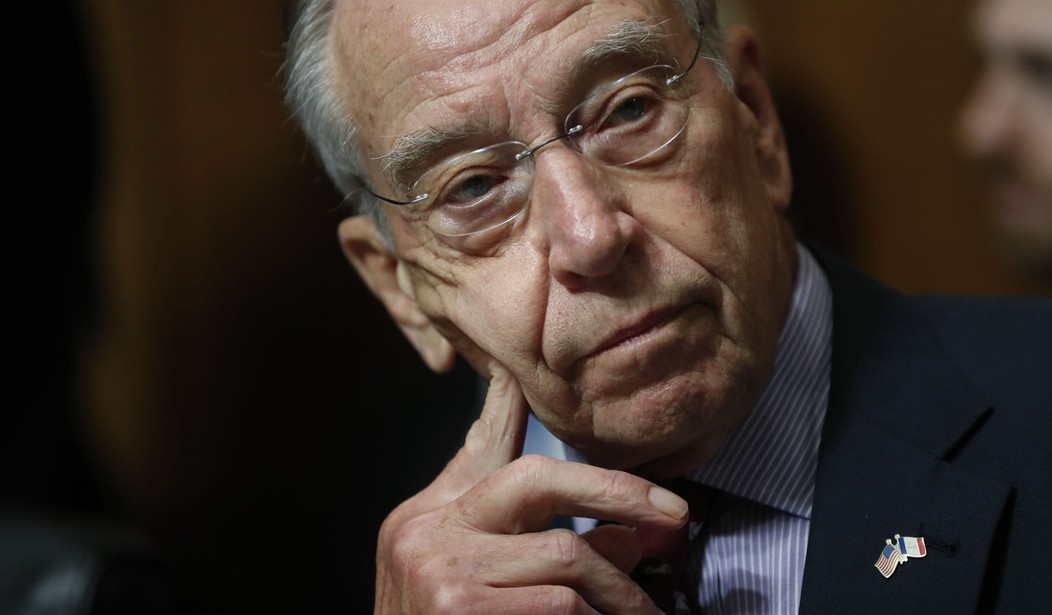It looks like the insulin industry’s price gouging racket may be coming to an end. And Sen. Chuck Grassley, R-Iowa, is leading the way.
On January 29, 2019, Grassley announced his intent to “specifically get to the bottom of the insulin price increase.” Less than a month later, the Republican senator from Iowa made good on his promise, questioning the manufacturers in a hearing and launching an investigation.
Conservatives have rightfully blamed bureaucrats and outdated laws for the often-high price of prescription drugs and market failures. On top of being an industry wrought with stratospheric liability, the government approval process is incredibly long and expensive. On average, it costs $2.6 billion and over seven years to bring a single drug to market, so it’s no surprise these expenses are reflected in prices in the earliest stages. Far too often these companies must fight a government system stacked against them to discover new cures and medical breakthroughs.
More government is not the solution to the pharmaceutical industry’s problems. The price controls on drugs that are being advocated by the likes of Sen. Bernie Sanders, I-Vt., bureaucrats in the FDA, and even some within the current administration may soothe the emotions but would ultimately make a complex problem worse, stifle innovation, and leave American patients worse off.
Sen. Grassley’s record on these issues demonstrates that he understands the dangers of stifling innovation with overregulation in the pharmaceutical industry. But in leading an investigation into the insulin industry, it’s equally clear that he comprehends how bad actions by a few manufacturers gaming the nation’s intellectual property laws can represent a threat that is just as devastating to the market.
Recommended
Although intellectual property laws were created by the government to safeguard innovation, the three companies that control 99 percent of the insulin industry — Eli Lilly, Novo Nordisk, and Sanofi — don’t see it that way. Using loopholes, they instead artificially extend the length of their patents — more than 70 per drug — to suppress competition and pad their personal bottom lines.
>Like price controls, no market principle justifies the insulin industry’s behavior. Their business tactics have limited competition and created a price-gouging oligopoly that raises the cost of insulin far above market rates, putting the lives of many of the 30 million Americans that suffer from diabetes at risk annually. The predatory, self-serving decisions of these three manufacturers have seemingly caused prices to triple since 2002, with Eli Lilly’s Humalog increasing by an astounding 585 percent from 2001 to 2015, reportedly leading to the death of insulin-dependent Americans that had no choice but to self-ration their medicine for financial reasons.
It's important to remember we’re talking about insulin, a drug that was discovered nearly a century ago and hasn’t changed much over the years since. Newly-discovered drugs rack up large expenses through extensive R&D processes and file for legitimate patents for scientific breakthroughs. The same cannot be said for insulin. Instead, insulin companies file patents for mere cosmetic tweaks to their products. In doing so, they prevent generic alternatives from entering the marketplace, and maintain their vice-like grip over the drug’s price.
The Founding Fathers created copyrights and patents to foster competition, not destroy it. They never intended for copyrights and patents to last forever; only for as long as needed to ensure creators reap the fruits of their effort, hence the constitutional limits on their duration. Even James Madison – regarded by many as the founder of U.S. intellectual property law – cautioned against the monopoly power that intellectual property could bring, potentially “[producing] more evil than good.” Eli Lilly, Novo Nordisk, and Sanofi have demonstrated all the tendencies that he advised policymakers to watch for. The actions of these few companies may ultimately threaten the industry as a whole if allowed to continue on course as their abuses fuel widespread political outcry that will inevitably be used to justify damaging price controls across the entire pharmaceutical industry.
Conservatives rightfully oppose onerous regulation in order to protect the life, liberty, and rights of the individual from unintended consequences. Sometimes, that means holding companies and industries seeking to undermine the very essence of free markets for their own benefit accountable. The insulin industry can be rehabilitated through patent reform and the enforcement of proper industry regulations—not price controls. Senator Grassley should be commended for seeing through the fog and stepping up to protect consumers and the free market.

























Join the conversation as a VIP Member